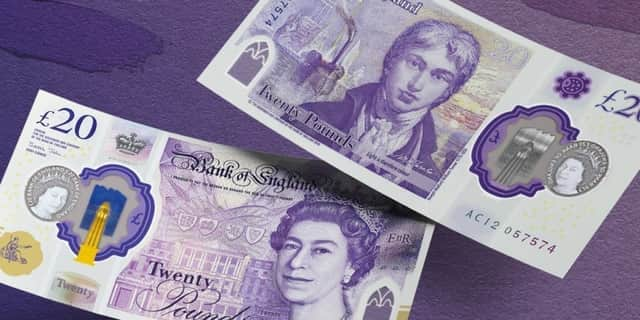How to spot a fake £20 note and what you should do if you get one


According to the Bank of England, fake notes are rare and typically make up less than 0.01% of the cash in circulation.
However, with the cost of living rising, it is a good idea to be careful of any fake £20 notes.
Advertisement
Hide AdAdvertisement
Hide AdIn Small Heath, Birmingham, Community activist Naveed Sadiq, came across the fake note after noticing a cashier examining money at a supermarket, Birmingham Mail reported.
He recorded an employee taking the seal off to reveal the words 'prop note' and a hole where the hologram should be.
What did he say?
Mr Sadiq, 46, first heard about the notes two weeks ago before seeing the note in the shop.
"I have never seen this type of note before. I made a video to raise awareness" he said.
Advertisement
Hide AdAdvertisement
Hide Ad"Prices have gone up and to lose £20 is a lot. If you have £60 worth of shopping and have got two of these notes, it's a lot.
"I work in a garage selling cars and we triple check £20 notes. You cannot tell the difference between the fake and the real notes.
"I saw a cashier looking at the note and I butted in.
"She had her doubts but then peeled it and it was a fake."
The video shows an ordinary £20 note, but the hologram can be peeled off with the words "prop money" written underneath the sticker.
How to tell if a note is fake?
The Bank of England published a guide to check whether notes are genuine or fake.
Advertisement
Hide AdAdvertisement
Hide AdThere are different checks depending on the different notes. This is what you need to know for £20 polymer notes:
Hologram
The word changes between ‘Twenty’ and ‘Pounds’ when the note is tilted on a real £20 note.
See-through windows
The foil on the metallic image over the main window is gold and blue on the front of the note and silver on the back on a real note.
A second, smaller window in the bottom corner of the note should also be visible.
The Queen’s portrait in the see-through window
Advertisement
Hide AdAdvertisement
Hide AdA portrait of the Queen should be printed on the window with ‘£20 Bank of England’ printed twice around the edge.
Raised print and dots
New £20 notes are printed on polymer, which is a thin and flexible plastic material, but in the corner, there is a cluster of raised dots for blind and partially sighted people to identify the value of the note.
On the front of the note, you can feel raised print saying "Bank of England'.
Silver foil patch
On a genuine £20 note, above the main see-through window on the front of the note, there is a silver foil patch containing a 3D image of the coronation crown.
Purple foil patch
Advertisement
Hide AdAdvertisement
Hide AdA second foil patch can also help you verify a £20 bank note.
It is a round, purple foil patch that contains the letter ‘T’.
This is located on the back of the note, directly behind the silver crown on the front of the note.
Print quality
Printed lines and colours on a genuine note are sharp, clear and free from smudges or blurred edges.If you use a magnifying glass, you will see the value of the note written in small letters and numbers below the Queen’s portrait.
Ultraviolet number
Advertisement
Hide AdAdvertisement
Hide AdUnder a good-quality ultraviolet light, the number ‘20’ appears in bright red and green on the front of the note, against a duller background.
What should you do if you have been given a fake note?
Take any fake notes to the nearest police station, and give as much detail as you can so the police can fill out an NCO-1 form.
Fake notes cannot be reimbursed. Any suspected notes will be sent to the National Crime Agency and, if they're fake, on to the Bank of England.